|
Games with a purpose (GWAPs) have proven to be effective solutions to solving difficult problems, labeling data, and collecting commonsense knowledge. Unlike traditional games, GWAPs must balance between acquiring accurate solutions or data and maintaining player engagement. However, when it comes to designing GWAPs, the effects of different game mechanics on accuracy and engagement are not well understood. We have conducted two studies to understand the way different choices of game mechanics and their affect on player behavior. |
The complexity of television shows has been increasing. In order to follow a story, viewers might be expected to stay abreast of more plot threads, remember more characters, and retain information introduced in earlier seasons. Media technology has made the job easier by allowing viewers to review in various ways; they may replay a scene or entire episodes, they may visit an online forum for fans, or they may play a video game that is related to that story. Game of Game of Thrones is a video game design intended to explore how a video game could enhance the viewing of a television series. |
The transition from novel to television creates the issue of compressing the story into episodes limited by time and budgets. HBO 's translation of Game of Thrones is a rich tapestry of characters and narratives; however, the viewer can lack backstory, geographic awareness, and an understanding of character relationships. This second-screen companion app orients viewers to the world of Westeros by mapping families throughout episodes. Greater character understanding is achieved by the mapping of character relationships, both during characters present in each scene or within the episode. 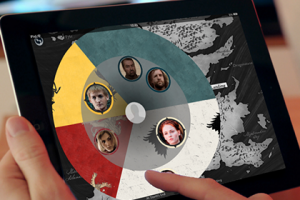 |
|
|
We have a multi-year project exploring how game performance and player behavior can be used to perform scientifically valid cognitive, personality, skill, and behavioral measures. This project involves hypothesizing about how game mechanics, levels, situations etc. could assess aspects of a player that are currently measured via validated traditional tests/activities/interviews, designing games around these hypotheses, and running user studies. Another aspect of this work is exploring how theming, feedback, game type influence the assessment validity and the players' desire to play the game. |
Most online learning platforms have a good enrollment rate, but the completion rate for courses is poor. Through a qualitative study (interviews, surveys, participatory design activitity) we tried to get a broader understanding on how gamification could be used as a motivation for learning, including the social context of participants. Further, we developed a gamified mobile application for practicing python and ran a longitudinal study (over 4 weeks of remote use, with intermediate surveys, and followed by interviews) to get an in-depth understanding of game elements that motivate learning. 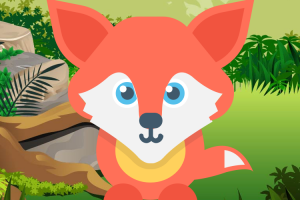 |
The focus of the project is on designing an in-car gaming experience for passengers. While in-vehicle entertainment is a growing field, we see the opportunity to design in-vehicle entertainment through digital games. |
The Garden of Us is an interactive digital garden that promotes connection and community well-being found on the Media Bridge, a mixture of vertical and horizontal screens helping to connect Georgia Tech's Libraries. Created by a multidisciplinary team, guests contribute to the digital garden by painting and submitting a personalized flower using a mobile web application. Watch as the garden grows, shifts, and evolves as more unique flowers are added. Every addition is welcome as it reflects Georgia Tech's diverse community. |
|
Georgia Tech and the Human Interface Branch of NASA partnered together to find a way to detect astronauts' body positions in space. In the zero-gravity space environment, it becomes difficult to monitor tasks that lead to repetitive stress injuries or fatigue. Monitoring movement would help NASA pinpoint high-stress actions and make adjustments to corresponding mission tasks. We developed an unobtrusive, textile-based system to monitor astronauts' arm position in real time, in zero gravity, and without the constraints of camera-based motion-input devices. 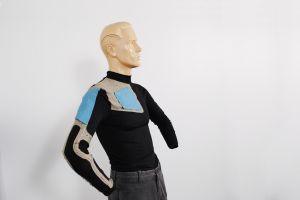 |
Gaming for good  Website: |
A framework to use machine learning techniques to generate rhythm action game stages from music |
A textual visualization that analyzes and presents beer review data to allow users to find a beer that meets their tastes. |
|
The Partnership for Inclusive Innovation supports community research across the State of Georgia by engaging a network of researchers, community leaders, and key stakeholders to advance local initiatives for innovation. Many of the projects are supported through the Georgia Smart Communities Challenge, a program that provides community research assistance by activating collaborations between researchers and municipalities to explore innovative uses of technology and data in pursuit of prosperity for all. Georgia Smart has supported 20 community research projects across the state. 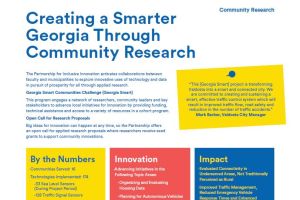 |
Robotics has been considered as one of the five key technology areas for defense against attacks with weapons of mass destruction (WMD). However, due to the mass impact nature of WMD, failures of counter-WMD (C-WMD) missions can have catastrophic consequences. To ensure robots' success in carrying out C-WMD missions, we have developed a novel verification framework in providing performance guarantees for behavior-based and probabilistic robot algorithms in complex real-world environments. We cannot assume the luxury of a do-over; we must get it right the first time. 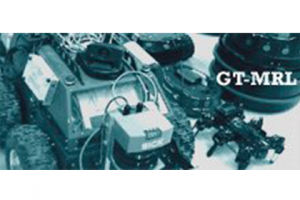 |
Giants in the sky is a Tangible User Interface (TUI) that explores the role of mass and gravity in the life and death of exosolar systems. With the use of various tangibles with different physical attributes, this TUI aims to teach basic concepts of astronomy in science museums. These tangibles allow users to create and manipulate digital celestial objects in a sandbox simulation. 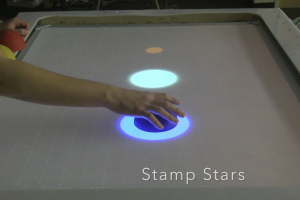 |


